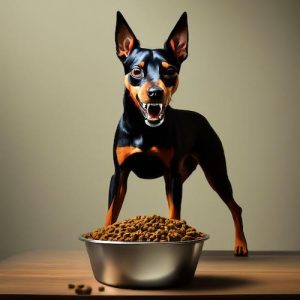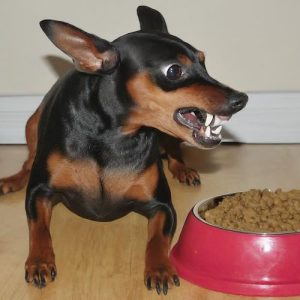
What is Food Aggression in Miniature Pinschers?
Don’t let their small size fool you! Miniature Pinschers, or Min Pins, can get surprisingly feisty about their food. Food aggression is when a dog feels the need to guard its food, and that might mean growling, snapping, or even biting. It’s a type of “resource guarding” – basically, your Min Pin sees their food as precious treasure and will defend it. While it might seem out of character for a small dog, remember that Min Pins were originally bred to hunt and be independent thinkers. That instinct to protect what’s theirs can extend to their food bowl, making them surprisingly fierce when they feel threatened.
Read: Top 10 Best Rated Dog Food Brands
Food aggression can look different from dog to dog. Some Min Pins might stiffen up and give a low growl if you walk near their bowl, while others might immediately snap or lunge at the perceived threat. The important part is recognizing that this behavior is rooted in fear and anxiety about losing their meal, not out of pure dominance or aggression. Understanding this helps when it comes to finding ways to help your Min Pin overcome this behavior.
Why Do Miniature Pinschers Develop Food Aggression?
While those big puppy-dog eyes and tiny stature might make food aggression seem unlikely in a Miniature Pinscher, this spirited breed can be prone to protecting their meals. Understanding why food aggression develops is the first step in managing or preventing this behavior
Here are the most common factors that contribute to food aggression in Min Pins:
It’s in Their Blood: Miniature Pinschers were originally bred as working dogs, tasked with hunting and protecting property. This background makes some Min Pins instinctively inclined to guard anything they deem valuable, including their food.
Scarcity Mentality: Puppies who experience inconsistent meals, struggle to compete for food with littermates, or face food insecurity can develop anxiety about their next meal. This often translates into food aggression as they mature.
Household Competition: Min Pins living with other dogs, or even food-motivated cats, may become possessive about their mealtimes. If they fear their food being stolen or if mealtimes feel chaotic, they might start guarding their bowl.
Lack of Training: Without clear training, a Miniature Pinscher might not understand that humans near their food bowl mean good things. It’s essential to teach your dog that you’re the source of their delicious meals, not a competitor for them.
The Role of Early Socialization in Prevention
The best way to prevent food aggression is to get your Min Pin socialized from a young age. That means lots of positive experiences with food around! Have people they like gently pet them while they eat, or occasionally drop yummy treats in their bowl. This shows them having others near their food means even better things happen. It’s about building the association between people and even MORE deliciousness rather than potential food thieves. Additionally, teaching your Min Pin basic commands like “leave it” or “drop” can be helpful in the event you need to interrupt them when guarding their food. This gives you some tools to redirect your dog’s focus away from the food and onto you.
Management: Safety as a Priority
When managing a Miniature Pinscher with food aggression, ensuring the safety of all household members and pets is paramount. Feeding them in a separate, secure area can prevent any potential incidents during mealtimes. This might be a quiet room where they can be closed off, their crate, or even a designated corner away from high-traffic areas of the house. Avoid direct confrontations over food, and instead, use strategies to safely manage and aim to reduce food aggression behaviors.
It’s crucial to remember that punishing a dog with food aggression will only worsen the problem, as it reinforces their fear and anxiety. If you need to remove an item (like a dropped piece of food) from a Min Pin who is resource guarding, focus on distraction and exchange. Toss a super yummy treat away from the guarded item, or offer a favorite toy as a trade. Never reach directly for what they consider their “treasure”.
If the behavior is severe, consider consulting a professional dog behaviorist to help you create a safe and effective management plan. They can also help to teach you how to spot the warning signs of aggression and safely intervene if needed.
Addressing Resource Guarding Beyond Food
Food aggression in Miniature Pinschers can be part of a broader spectrum of resource-guarding behavior, which may include guarding toys, beds, or even people. Addressing this behavior requires a comprehensive approach that focuses on building trust and changing the dog’s associations from negative to positive when humans approach their resources.
It’s important to recognize that resource guarding isn’t just about food. Min Pins might exhibit similar possessive behaviors over things they deem highly valuable. This is why working with a qualified trainer can be so helpful. They can assess your Min Pin in a variety of situations to determine if there are other triggers beyond their food bowl.
The training approach will still focus on building trust and those positive associations. This might mean rewarding your dog for calmly moving away from their favorite chew toy when you walk by, or practicing trading low-value items for high-value treats to establish that giving up their stuff sometimes results in something even better. A trainer will teach you the steps to take to make these exchanges smooth and stress-free for your Min Pin.
Search: Best Selling Miniature Pinscher Dog Food
Training: Building Trust and Changing Associations
Reducing food aggression in Miniature Pinschers involves building trust and changing their negative associations with people near their food into positive ones. This process uses positive reinforcement to reward non-aggressive behaviors and gradually desensitizes the dog to human presence during meal times. Here’s how it works:
Start slow and build gradually: Begin by simply being in the room while your Min Pin eats, without directly approaching them. Toss treats at a distance while they eat, showing them good things happen when you’re around. Over time, you can slowly decrease the distance between yourself and their food bowl as they remain calm.
Reward calm behavior: Watch for signs of relaxation, like a wagging tail or relaxed body. Reward those behaviors with praise or an additional treat.
Avoid Punishment: Punishment or forceful removal of food will only escalate fear and worsen the problem.
Consistency is Key: Consistency in training is critical for success. Practicing these positive reinforcement methods regularly will gradually help your Min Pin build positive associations with human presence during their mealtimes.
Working with a professional trainer specializing in resource guarding and positive reinforcement methods can provide customized guidance to safely and effectively change your dog’s behavior.

Step-by-Step Training Examples
Here are some practical examples of techniques you can use in your training sessions:
-
Hand Feeding: Begin by hand-feeding your Miniature Pinscher parts of their meal to build a positive association between human hands and food. This establishes trust and shows your dog that you are the source of good things.
-
Approach and Add: While the Miniature Pinscher is eating from their bowl, approach and add a high-value treat to the bowl, then step away. This teaches the dog that human approach during mealtime results in positive outcomes, not threats to their food. Start with a good distance between you and the bowl, gradually closing the distance over time as your dog stays relaxed.
-
Trade-Up Game: Encourage your Miniature Pinscher to willingly give up their current food or toy in exchange for something better. Start with a low-value item and offer them something irresistible in return. This training exercise helps them learn that relinquishing a resource can result in receiving something even more valuable, thus reducing the urge to guard.
Important Note: Always progress training at a pace comfortable for your dog. Avoid any methods causing fear or anxiety, as this can escalate the aggression. If you’re unsure of how to proceed or if the aggression is severe, consult a qualified dog behaviorist for personalized guidance and a comprehensive behavior modification plan.
Important Training Considerations
Consistency and Patience: Training a Miniature Pinscher to overcome food aggression requires patience, consistency, and understanding. Stick to the step-by-step exercises regularly, and progress at your Min Pin’s pace. Avoid any form of punishment, as it can exacerbate aggression and fear while damaging your bond with your dog.
Seek Professional Help: For severe cases of food aggression, consulting a professional dog trainer or behaviorist experienced in dealing with such issues is advisable. A professional can help you tailor the training to your Min Pin’s specific needs and ensure you’re working with them in a safe and effective manner.
Positive Reinforcement: Focus on using positive reinforcement methods, rewarding desired behaviors to strengthen the Miniature Pinscher’s positive associations with human presence during mealtimes. This builds trust and helps change their perspective from defensiveness to “my human means yummy treats!”
Safety Measures: Always prioritize safety by employing management techniques like feeding them in a separate area to prevent aggressive incidents during the training process. This allows you to focus on changing their behavior without worrying about someone accidentally getting hurt.
Conclusion
Addressing food aggression in Miniature Pinschers involves understanding the underlying causes, implementing preventive socialization practices, and employing effective, safe training methods. While overcoming resource guarding may take time, patience, and consistency pay off. With the right approach and commitment, most Miniature Pinschers can learn to eat peacefully, ensuring a safer and more harmonious living environment for everyone involved.
Remember, if you are struggling to train a food-aggressive Miniature Pinscher, reach out to a qualified professional. A dog behaviorist or trainer specializing in resource guarding can provide expert guidance, customized training protocols, and additional support, ensuring long-term success. By working patiently with your feisty Min Pin and teaching them that people around their food bowl mean good things, you can foster a stronger bond and create a calmer, happier home for both you and your beloved companion.
